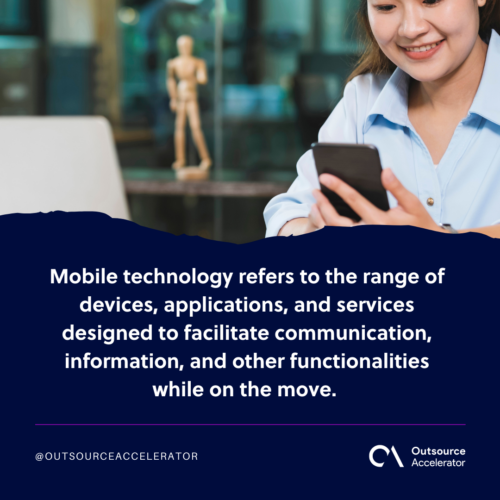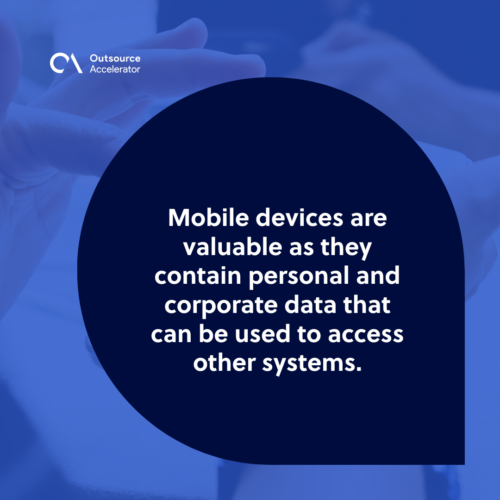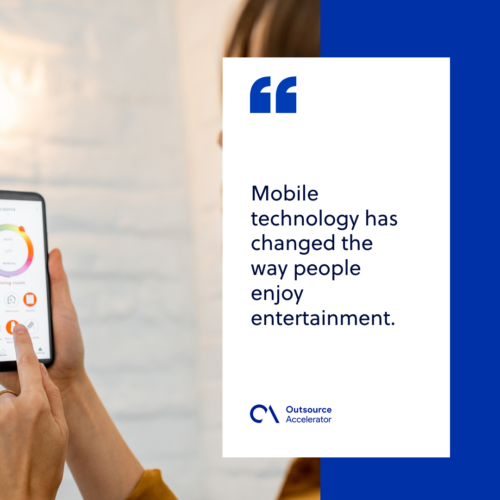How mobile technology is shaping digital communication

Since the introduction of the first portable phone, the world of mobile technology has transformed at an astonishing pace.
It’s accelerated the pace of innovation, revolutionized how we work and live, and provided new avenues for growth and development. From the widespread adoption of mobile apps to the emergence of 5G, mobile technology offers limitless possibilities and potential.
Let’s dive into the common mobile technologies and their impact on our lives.
What is mobile technology?
Mobile technology refers to the range of devices, applications, and services designed to facilitate communication, information, and other functionalities while on the move.
Crucial to mobile technology are mobile devices, including:
- Smartphones
- Tablets
- Laptops
- Wearables
- Portable digital assistants (PDAs)
- Other gadgets equipped with wireless capabilities
Mobile technology leverages networks to stay connected, access the internet, and utilize applications while untethered to a physical infrastructure.

Types of mobile technologies
Several mobile technologies have emerged over the years, each playing a pivotal role in shaping how we communicate, access information, and interact with digital content.
Here are some prominent types of mobile technologies:
SMS
Short message service (SMS) enables the interchange of short text messages between mobile devices.
It’s a basic and most widely used communication on mobile devices, enabling quick and concise information exchanges.
SMS works on a fixed line of mobile telephony systems. It was originally developed to allow wireless communications between mobile stations.
MMS
Multimedia messaging service (MMS) extends the capabilities of SMS. It allows users to send text and multimedia content such as images, videos, audio files, and contact cards.
They’re similar to emails but are only accessible to devices suited to MMS capabilities. MMS allows users to convey more comprehensive and visually rich information than SMS.
Cellular networks
Cellular networks transmit data between mobile devices through radio waves. A cell tower acts as a relay between each device and the rest of the world.
This form of mobile technology encompasses various generations, such as 2G, 3G, 4G, and 5G.
Wi-Fi
Wi-Fi mobile technology enables wireless internet connectivity via a wireless local area network (WLAN).
Wi-Fi is currently offered in many public spaces as well. Mobile devices can connect to Wi-Fi “hotspots,” allowing for high-speed data access and reducing reliance on cellular data networks.
Bluetooth
Bluetooth mobile technology facilitates short-range wireless communication between devices.
It’s used for tasks like file sharing, connecting to accessories like headphones or speakers, and enabling devices to communicate with each other directly.
Impact of mobile technology on society
Mobile technology has become intrinsic to our daily lives. However, like any powerful tool, it comes with its share of positive and negative effects:
Negative effects
Mobile technology poses the following drawbacks:
Health concerns
There’s been much concern over the negative effects of prolonged mobile technology and device usage on health.
Extreme phone usage can cause health issues like:
- Digital eye strain
- Neck pain
- Disrupted sleep patterns
Excessive use of mobile technology can also contribute to a sedentary lifestyle, leading to problems like obesity and cardiovascular issues.
Addiction and overuse
Addiction is defined as “a physical or psychological dependence on something, like a drug.”
The addictive nature of mobile apps, social media, and online games can lead to extreme usage. Users are likely to neglect real-world interactions and responsibilities as a result.
Once a person has become addicted, it’s very difficult to change their habits.
Cybersecurity risks
The rise of mobile technology has opened up new opportunities for criminals to target businesses, employees, and consumers. Mobile devices are valuable as they contain personal and corporate data that can be used to access other systems.
Everyone online is vulnerable to various cybersecurity threats, including malware, phishing attacks, and data breaches.

Social isolation
While mobile technology enhances digital communication, it can also lead to reduced face-to-face interactions.
People spend more time at home and less outdoors. This is a problem because social interactions are essential for healthy living.
Social isolation can cause stress and depression, leading to long-term health problems.
Digital divide
Mobile technology is definitely more widespread today than just a few years ago, but it’s still far from accessible to everyone.
The “digital divide” refers to the disparity between those with access to information and communication technologies (ICTs) and those without. Factors like affordability, infrastructure, and geographic location cause this divide.
The digital divide produces social, economic, and educational inequality. Mobile technology has only exacerbated this.
Positive effects
But despite mobile technology’s negative effects, it also offers an array of advantages like the following:
Instant communication
Probably the biggest benefit of mobile technology is its ability to enable instant communication. It’s easier than ever to connect with friends, family, and colleagues no matter where they are in the world.
Aside from improving personal relationships, it has also benefited business owners in monitoring reaching their employees and customers.
Access to information
With mobile technology, users have access to a vast pool of information, especially via the Internet. Going online has been one of the biggest reasons that mobile devices have recently taken off.
As long as you have a connection, you can access all sorts of information through websites, apps, and even digital books. People and institutions can find out more about what they want and need.
Entertainment options
Mobile technology has changed the way people enjoy entertainment. You get a wide range of entertainment options from a smart device, from gaming and streaming services to augmented and virtual reality experiences.
The combined selection caters to diverse preferences, ensuring there’s something for everyone.

Economic opportunities
The growth of mobile technology has led to new careers in the field. There are many opportunities for people to work, from software engineers to accountants and designers.
Mobile technology also fosters economic growth by facilitating e-commerce, digital payment systems, and online marketplaces. It also empowers small businesses to reach wider audiences.
Efficient task management
Mobile technology enables workers to perform their tasks more efficiently by providing on-the-go access to company data.
Software tools aid in task management, scheduling, and organization, enhancing productivity in both personal and professional settings.







 Independent
Independent




